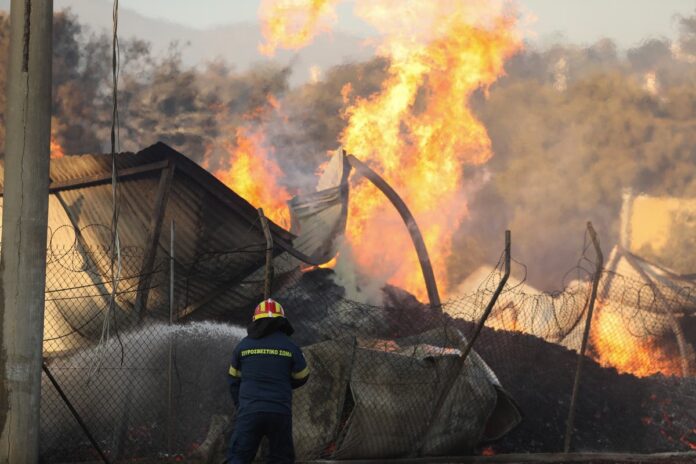Support truly
independent journalism
Our mission is to deliver unbiased, fact-based reporting that holds power to account and exposes the truth.
Whether $5 or $50, every contribution counts.
Support us to deliver journalism without an agenda.

As millions watched the Olympics coming to an end with the passing of the torch from Paris to LA, Greece, the birthplace of the games, was starting to battle a new flame rising on Sunday.
The country’s worst wildfire this year continued to spread into the Athens suburbs on Monday evening after first igniting on Sunday afternoon, forcing hundreds of people to flee homes and hospitals.
Tourists on the hills around the Acropolis watched as smoke spread over the busy city. A warning has been issued to anyone near affected areas to exercise caution when leaving the house due to the density of the smoke. Power cuts were reported in several parts of the capital, now thick with the smell of burning.
The fire was burning in a wide arc on the capital’s northeastern fringes, sending a blanket of smoke over central Athens on Sunday. There has been no disruption reported at Athens airports where those landing and taking off could see a wall of smoke darkening the sky on Monday morning.
For updates on the wildfire – follow our live blog by clicking here
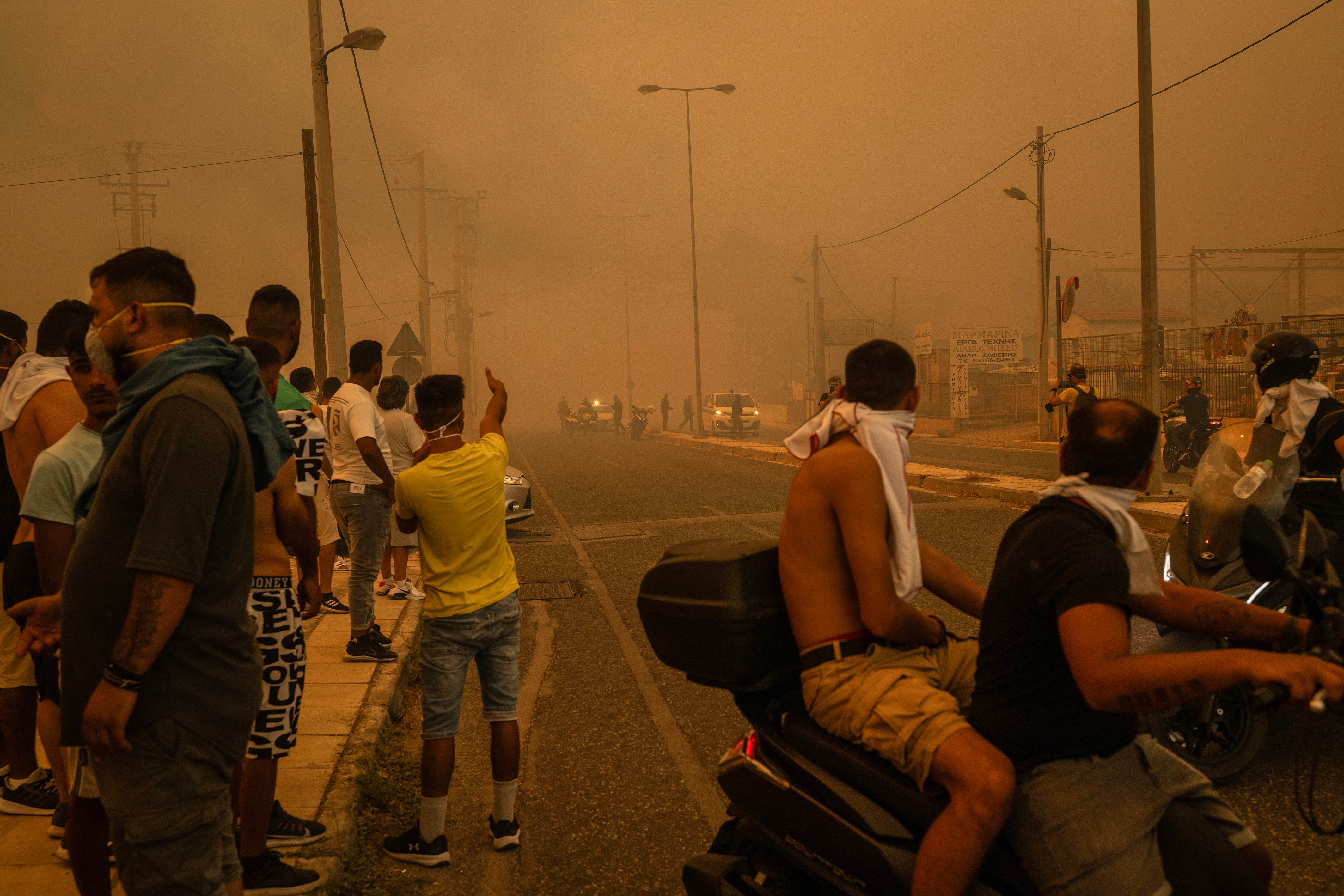
More than 700 firefighters backed by volunteers, 190 fire engines and 33 waterbombing aircraft have been battling the blaze that broke out at 3pm on Sunday near the village of Varnavas 35km (20 miles) north of Athens. It was fanned by strong winds that quickly drove it out of control, more strong winds are predicted for the rest of the week.
Meteorologists and government officials have warned of the heightened danger of wildfires because of weather conditions from Sunday until Thursday, with half of the country placed under a “red alert” for wildfire hazard.
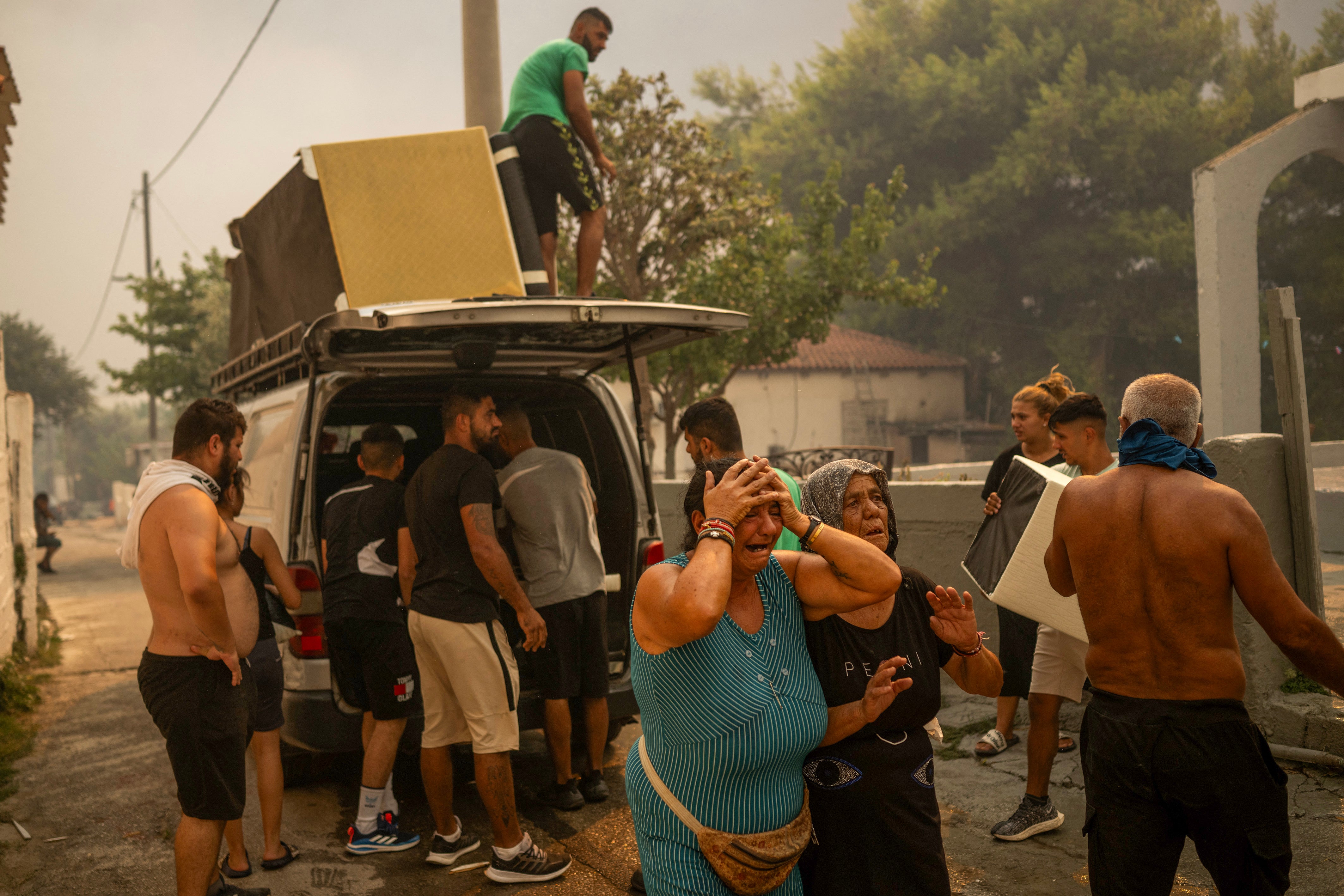
Flames towered at times to heights of over 25 metres (80ft), as the wall of flames edged towards more densely populated areas. The wildfire raced through pine forests left tinder-dry by the hottest June and July ever recorded in Greece.
More than 25 areas were forced to evacuate residents, government officials said, along with at least three hospitals.
As the flames closed in on backyards on the outskirts of Athens, some residents in the wooded and hilly Penteli neighbourhood stayed put, trying to put out pockets of fire using hoses or tree branches.
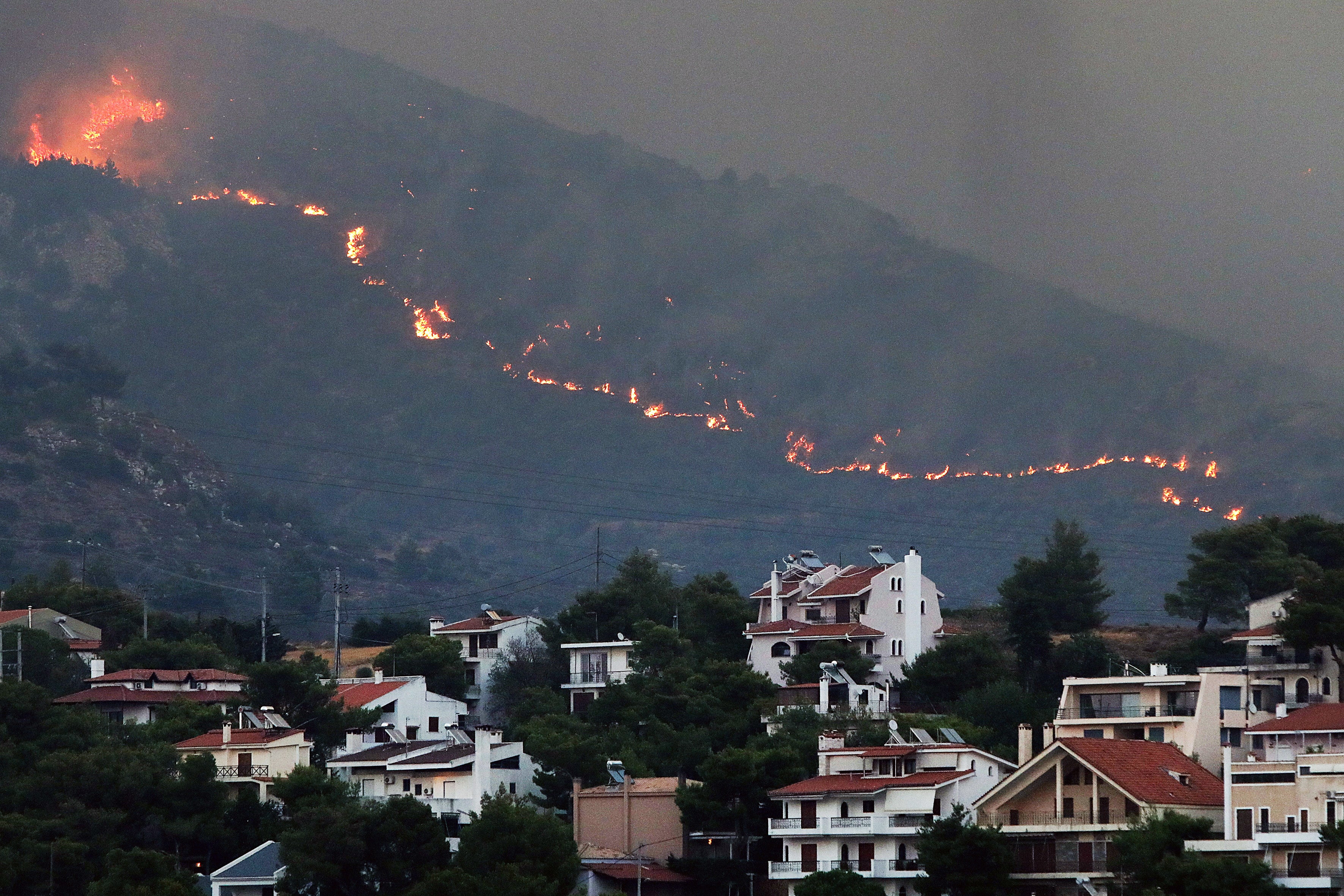
One resident, Pantelis Kyriazis, crashed his car as he tried to escape the encroaching flames. “I couldn’t see, I hit a pine tree and this is what happened,” he told Reuters at the scene.
The fire has reached Vrilissia, around 14km (8 miles) from the heart of Athens.
There were no reports of trapped residents, and authorities said 15 people were injured across areas afflicted by the fire, mostly due to smoke inhalation.
Three Athens hospitals were put on heightened alert.
One fire is raging around Mount Penteli, famous for its marble quarries used in the Acropolis, and the adjoining Athens suburb of the same name where three hospitals have been evacuated.
In an interview with Alpha TV, the president of the Panhellenic Federation of Firefighters, Nikos Lavranos, described the situation as worrying: “The fire has gone beyond the pure forest area, as it has now entered a residential area. It has the characteristics of an urban fire. We are seeing schools and houses burning, which are different conditions.”
A map of the fires:
Meanwhile, in nearby Marathon, the town which gave its name to the long-distance race that is the centrepiece of the Olympics, mayor Stergios Tsirkas said the region was facing a “biblical catastrophe”.
A forest fire had also reached the grounds of the National Observatory of Athens on Koufou Hill on Monday evening, with scientists warning equipment was under threat.
Authorities were faced with “an exceptionally dangerous fire, which we have been fighting for more than 20 hours under dramatic circumstances”, climate crisis and civil protection minister Vassilis Kikilias said.
The fire was burning mainly on two separate fronts, with some parts in particularly difficult-to-reach areas on a mountain northeast of Athens, Mr Kikilias said.
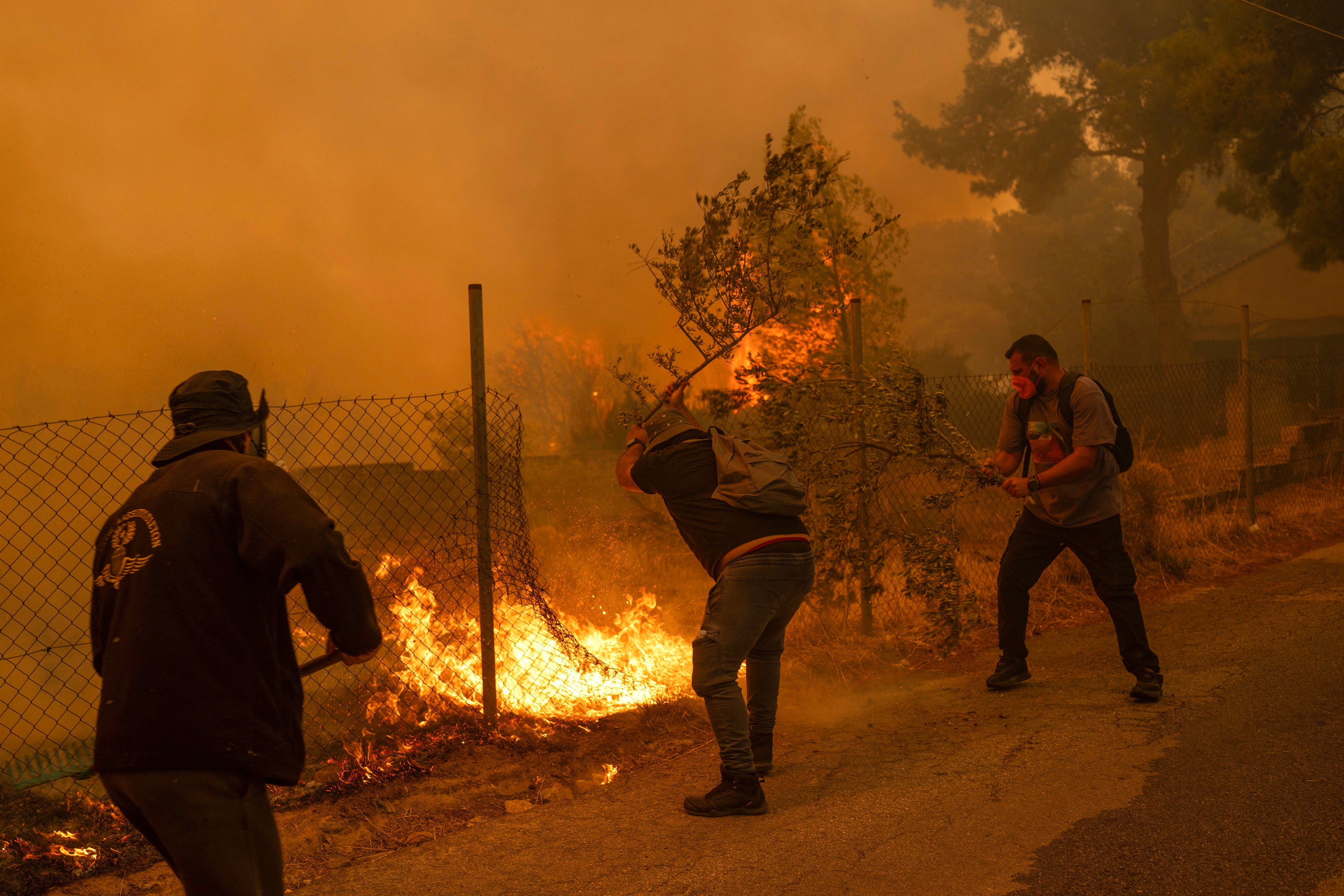
On Monday afternoon the Greek authorities requested assistance from the EU Civil Protection Mechanism to fight the wildfires. French interior minister Gerald Darmanin said France would send a helicopter, 180 civil security personnel and 55 fire engines. Greece’s civil protection authority said Italy was sending two water-dropping planes and the Czech Republic was sending 75 firefighters and 25 vehicles. Spain and Turkey were also finalising reinforcements to send to Greece.
Ursula von der Leyen took to social media to show support: “We stand with Greece as it battles devastating fires,” the president of the European Commission wrote, adding: “This is #EUSolidarity in action.”
Some Greeks questioned why help wasn’t requested overnight when strong winds were forecast.
Smaller fires have broken out across the country and some islands have faced water shortages thanks to a lack of rain and an increase in tourists over the summer.
Wildfires are frequent in Greece during its hot, dry summers, but authorities have said climate change is fuelling bigger and more frequent blazes.
In 2018, a massive fire swept through the seaside town of Mati, east of Athens, trapping people in their homes and on roads as they tried to flee in their cars.
More than 100 people died, including some who drowned trying to swim away from the flames.
Last year, wildfires in Greece killed more than 20 people, including 18 migrants who became trapped by the flames as they trekked through a forest in northeastern Greece and were caught by a massive fire that burned for more than two weeks.
Additional reporting by agencies.
Read More: Greek firefighters to battle through the night as flames threaten Athens


